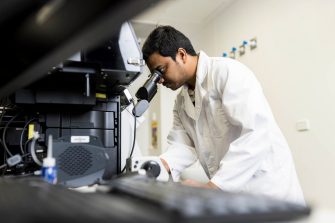Computer Engineering
Learn to design and develop computer systems, from the software to the hardware too.

What is Computer Engineering?
Computer Engineers design and develop computer systems as well as the hardware elements. It’s how we maintain and design our vast networks of computer technology and are able to develop new efficient technology like smart watches and smart phones that fold or bend. Computer Engineering involves the design of new electronic and software systems, and supports a range of critical industries like aviation and aerospace, intelligent transportation systems, advanced healthcare, finance, smart power systems, and green technology.
Why study Computer Engineering?
This study area is incredibly broad and gives you plenty of flexibility while you study and when it comes to getting a job. You can think of the field as a combination of electronics engineering and computer science, with a focus on the interaction between these elements. You’ll study maths and physics as well as core computing, digital design and electronics courses. You will also have the choice to study electives in areas like networks, computer and hardware security, operating systems, embedded systems, and artificial intelligence.
Why choose UNSW?
Become a leader in innovation and development of new technologies that impact the world when you study Computer Engineering. We're ranked #4 in Australia for Computer Science (QS World University Rankings by Subject, 2025). UNSW Computer Science and Engineering is one of the largest schools of its kind in Australia with technically challenging computing degrees to prepare you to excel in the industry.
What about careers?
If you love working to create new things, computer engineering is a great career for you. Computer Engineers are typically found in research and development roles, working on different types of computer and embedded systems. Many computer engineers work in high tech manufacturing firms, computer system design firms, research and design firm or for the government.
Career options include:
- Network Architect
- Computer and Information Research
- IT Specialist
- Computer Engineer
- Embedded Systems Engineer
- Firmware Developer
- Low-level Operating Systems roles
How can I study Computer Engineering?
-
Our specialised degree, the Bachelor of Engineering (Honours) (Computer Engineering) will provide you with strong skills and knowledge to enter the computer engineering industry.
We offer a range of engineering program specialisations that can be undertaken in our Engineers Australia accredited degrees. You can study Computer Engineering in the following undergraduate degrees/compatible degrees:
Double degrees



